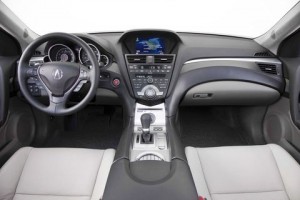American Honda Motor Company is alerting owners of new 2010 Acura ZDX models to bring the large crossover vehicle into a dealership for an instrument panel inspection.
The unspecified supplier of the dashboard has told Honda that a laser-cut scoring on the underside of the dashboard surface material is missing.
As a result, the passenger side airbag of the 2010 ZDX will not deploy properly, according to Honda documents revealed by the National Highway Traffic Safety Administration.
About 1,850 Acura ZDX vehicles are affected covering five months of production.
Honda says the dashboard inspection is a simple visual check. After the dealer inspection, if a ZDX is determined to have a dashboard without the proper scoring, the dashboard will be replaced.
Honda also has told Acura dealers to stop selling ZDX models, pending the inspection.
Owners of affected vehicles will be informed by mail starting April 21. ZDX owners can go to http://owners.acura.com/recalls, or owners may call (800) 382-2238 for more information. NHTSA recall number 10V-145.
Honda has had previous trouble with airbags, which remain potentially deadly explosive devices in all automotive applications.
In February of 2010, Honda enlarged a previously announced recall of 2001 and 2002 model-year vehicles to replace the driver’s airbag inflator in an additional 378,758 vehicles in the U.S. The driver’s airbag inflators in these vehicles may deploy with too much pressure, which can cause the inflator casing to rupture and could result in injury or fatality.
More than a year earlier Honda informed NHTSA of a plan to conduct a recall on fewer than 4,000 model year 2001 Accord and Civic models to replace the driver’s airbag inflator, based on what turned out to be a defective analysis of the needed size of the safety recall.
Makers, of course, traditionally try to limit the scope of safety recalls to reduce the cost and limit reputational damage.
The NHTSA practice of allowing negotiated recalls, and the fact that NHTSA in its entire history has never ordered a maker to conduct a safety recall came under scrutiny — and criticism — during U.S. Congressional hearings regarding Toyota unintended acceleration matters, which are allegedly responsible for more than 50 deaths.

